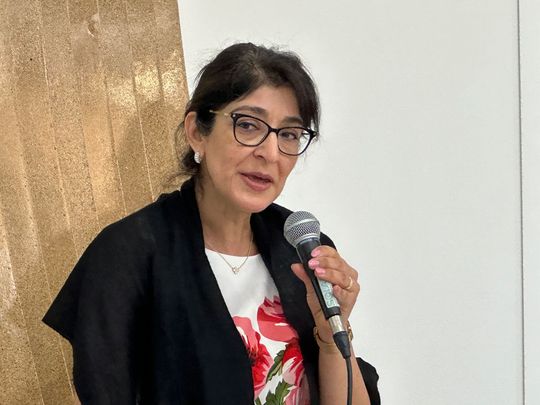
Dubai: Space is the final frontier. That’s according to Captain Kirk of the starship Enterprise in the TV series Star Trek. Pure fiction!
What’s the reality? In the space above the Earth, there are satellites. Eyes in the sky. These satellites are sentinels, tracking activities on the ground. They are also listening posts, picking up and transferring data signals.
So, how does space help fight climate change? “Without space, we wouldn’t know there’s a climate crisis. We would think it’s getting hotter. It’s snowing already. We would notice the change, but we would not know there’s a global climate crisis, Aarti Holla-Maini told the gathering at the UAE Space Agency Pavilion at the COP28 Technology Hub.
Drought and rising temperature
The director of the United Nations Office for Outer Space Affairs (UNOOSA) said images from meteorological satellites and the International Space Station helped the United States trigger early warning systems and save lives when Hurricane Florence hit North Carolina.
Citing the example of Lake Urmia in Iran, Holla-Mainni said: “Over 40 years, 90 per cent of the lake has evaporated due to rising temperature. It’s drought, agricultural water use, dams and politicisation of water issues that have affected us. It’s first and foremost climate change.”
read more
- At least 60 countries to sign the Global Cooling Pledge at COP28 today
- Bee The Change: Expo City Dubai pushes global coalition to save pollinators
- UAE: IEA chief recommends including ‘orderly decline of fossil fuels’ in COP28 outcome
- COP28 in Dubai: TikTok launches $1 million initiative to fight climate disinformation and misinformation
If there’s a 2˚C increase in global temperature, the world’s supply of coffee will halve. It’s the same story with chocolates [as it affects cocoa production]. That’s where satellite imagery comes in and it helps restore the coffee supply. It will also help the farmers who depend on it for their livelihood, the UNOOSA chief said.
Increasingly, shipping companies are using satellite communications with the help of sensors on shipments to monitor the condition of perishable goods that are ferried across the globe, Holla-Mainni said. It helps improve their efficiency in transporting goods, thereby reducing carbon emissions.
Curbing illegal fishing
Another area where space helps is in curbing illegal, unreported and unregulated fishing. “That’s a threat to marine ecosystems worldwide,” the UN official said and cited how Peru used satellites to fight illegal fishing. They were able to find the positions of fishing vessels even when they failed to report and turned off their communication devices
Images from space are used to monitor the health of forests and fight deforestation, Holla-Mainni said, reeling off more applications, including an early tsunami warning system.






